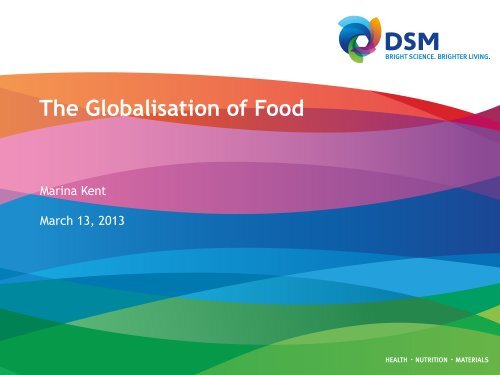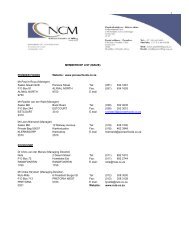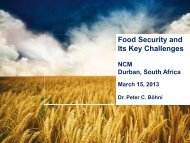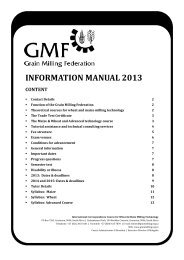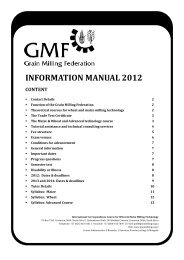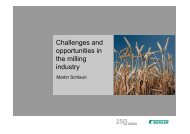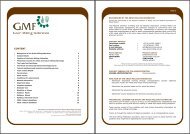DSM Presentation - National Chamber of Milling
DSM Presentation - National Chamber of Milling
DSM Presentation - National Chamber of Milling
Create successful ePaper yourself
Turn your PDF publications into a flip-book with our unique Google optimized e-Paper software.
The Globalisation <strong>of</strong> Food<br />
Marina Kent<br />
March 13, 2013
Page 1
Page 2
Page 3
Page 4
Page 5
Page 6
Page 7
Page 8
Page 9
Page 10
Globalisation and agriculture<br />
Agricultural exports from developing countries have<br />
declined form 50% <strong>of</strong> total traded goods in 1960 to 6% in<br />
2000<br />
• 2030-net importers<br />
• Policy<br />
• OCED countries-held back growth <strong>of</strong> agricultural exports<br />
from developing world via trade barriers and support for<br />
domestic production.<br />
• In 2000 totaled US$ 245 billion in the OCED countries<br />
• Market<br />
• Agricultural development hampered by saturated<br />
developed markets (c<strong>of</strong>fee cocoa and tea)<br />
Page 11
Liberalisation <strong>of</strong> trade-Who wins?<br />
• Benefits mainly to consumers and taxpayers in industrial<br />
countries (where agriculture is most protected) and to<br />
agricultural exporters from developing countries<br />
• Urban and landless rural in developing countries could<br />
end up paying more<br />
• This is because developing countries have become net<br />
importers <strong>of</strong> food, dropping OCED subsidies would<br />
merely bring about a shift in market shares <strong>of</strong> the OCED<br />
countries.<br />
Page 12
Liberalisation <strong>of</strong> trade-how to<br />
ensure the vulnerable win<br />
• Eliminate subsidies<br />
• Simplify access to OCED markets<br />
• Reduce OCED tariffs<br />
• Ensure safety net for low income consumers to shield form<br />
price increases in imported food.<br />
• Committed investment in agricultural productivity<br />
Page 13
Does globalisation disadvantage<br />
developing countries?<br />
• Technological advances in transport and communication<br />
means moving goods around the world easier and cheaper<br />
• Countries with physical and infrastructural hindrances will<br />
be disadvantaged<br />
• A reason for Africa to be concerned about global<br />
environmental issues is that most poor countries are<br />
clustered around the equator which will be the most<br />
affected by crop damage associated with climate change<br />
Page 14
Does globalisation disadvantage<br />
developing countries?<br />
Page 15
Can developing countries benefit<br />
from Globalisation?<br />
• Countries may become poorer relatively if they fail to<br />
benefit from globalisation<br />
• Also requires openess to international trade and investment<br />
by Multi <strong>National</strong> Enteprises<br />
• Government investment<br />
Page 16
References: FAO World Agriculture-Towards 2015/2030-Summary report<br />
Climate Change Challenge for the Poor, Yale Global<br />
The Economist, The World in 2013


